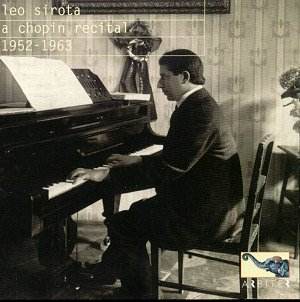AVAILABILITY
www.arbiterrecords.com
This, my third encounter with Leo Sirota, confirms
in almost every respect the impression made by the earlier volumes
in Arbiter’s series. Born in Kiev he became a pupil of Busoni,
spent sixteen years in Japan and the remainder of his life, after
the War, in St Louis. His commercial recordings were few and always
pretty inaccessible and these live radio broadcasts recorded between
1952 and 1963 are part of a collection preserved the better now
to further his memory.
Students of Busoni’s pedagogy and of pianistic
trends generally will welcome the opportunity this series affords
one to analyse Sirota’s playing. What I hear is a stylist of great
gifts whose affinities with the Russian repertoire and Liszt are
notable and the same is true of his Chopin playing. What is unavoidably
true is his technical frailty - and time and again performances
are vitiated by damaging weaknesses that will disconcert those
unprepared to listen through them. There are moments when his
own awareness of these limitations is apparent and his wild overcompensation
– mostly flurried accelerandi – adds its own obvious dangers.
I mention this – and the tape hiss – at the outset. This is a
specialist issue and needs to be set in its proper context.
Given these drawbacks, and the sound of the piano
in some of these radio sessions which is not immediately ingratiating,
and one might think it’s best to call it a day. But not so. The
Nocturne in B, which dates from two years before Sirota’s death,
shows us immediately what a sensitive and imaginative musician
he was, albeit one who seemed consistently to favour an overstressed
left hand which vests paragraphs with unequal hand distribution
and obscures melody lines. He shows his mastery of the Scherzo’s
lyrical sections – when he has the chance, simply and uncomplicatedly
to sing he really takes flight, but the pity is the messy technique
that fails to deal with the surrounding thickets. The problem
is that the now diminished technique inhibits him from one crucial
thing and that’s judging the climaxes of phrases adequately, as
in the F minor Ballade – opens very fast, then slows, then fractures
in the face of insurmountable problems. But when one doesn’t expect
it he can surprise, as in a generally impressive Fantasie Impromptu
and a good Etude in A flat from 1953 where he exhibits far better
control. The Fantasie in F minor sees him use rather too much
pedal and though it starts well it soon buckles in the virtuosic
runs causing him to skip notes and overcompensate through thunderous
attacks. As with many pianists his Andante Spianato is most impressive
whilst the conjoined Grand Polonaise is much less so. The former
is elegantly elastic and despite odd finger slips there’s real
beauty of tone; the latter is a thunderous, prodigious effort
with one glaring memory lapse along the way and a torrent of compromised
pianism.
Twenty years previously I suspect much of Sirota’s
playing would have seen conception matched by execution. That
it so plainly isn’t in these sessions might seem fatally undermining.
I agree that tolerance is necessary but no sentimental sympathy.
Time had taken its hold on Sirota and maybe his teaching and other
commitments meant that he hadn’t enough time to practice. Whatever
the reason, and the weaknesses, there is still undeniably a rich
vein of nobility and ardour running through Sirota’s playing.
Jonathan Woolf
